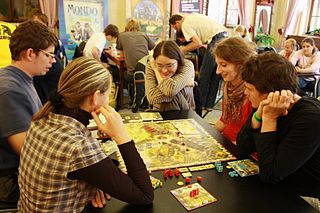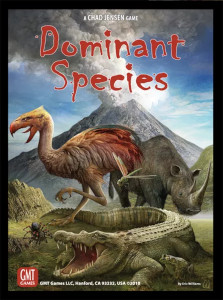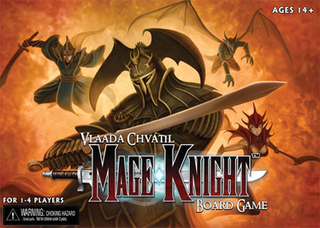Related Research Articles

The Spiel des Jahres is an award for board and card games, created in 1978 with the purpose of rewarding family-friendly game design, and promoting excellent games in the German market. It is thought that the existence and popularity of the award was one of the major drivers of the quality of games coming out of Germany, particularly in the 1980s and 1990s. A Spiel des Jahres nomination can increase the typical sales of a game from 500 to 3,000 copies to around 10,000; and the winner can usually expect to sell to as large as 30 million copies.

A strategy game or strategic game is a game in which the players' uncoerced, and often autonomous, decision-making skills have a high significance in determining the outcome. Almost all strategy games require internal decision tree-style thinking, and typically very high situational awareness.

XCOM is a science fiction video game franchise featuring an elite international organization tasked with countering alien invasions of Earth. The series began with the strategy video game X-COM: UFO Defense created by Julian Gollop's Mythos Games and MicroProse in 1994. The original lineup by MicroProse included six published and at least two canceled games, as well as two novels. The X-COM series, in particular its original entry, achieved a sizable cult following and has influenced many other video games; including the creation of a number of clones, spiritual successors, and unofficial remakes.
Thomas J. Vasel is a podcaster, designer and reviewer of board games, and has hosted the The Dice Tower podcast since 2003, which has more than 100,000 subscribers. Vasel began publishing board game reviews in 2002 on BoardGameGeek, followed by YouTube, and his Dice Tower website. As of 2021, he has rated some 7000 games and expansions. His first board game review was for The Settlers of Canaan. Of his children, Jack Vasel was lost in 2011, resulting in Vasel establishing the Jack Vasel Memorial Fund, a not-for-profit fund with the goal of raising and distributing funds to help gamers in their hour of need. Vasel was also the designer of the boardgame Vicious Fishes in 2010, and co-designer for the boardgame Nothing Personal in 2013.

Pandemic is a cooperative board game designed by Matt Leacock and first published by Z-Man Games in the United States in 2008. Pandemic is based on the premise that four diseases have broken out in the world, each threatening to wipe out a region. The game accommodates two to four players, each playing one of seven possible roles: dispatcher, medic, scientist, researcher, operations expert, contingency planner, or quarantine specialist. Through the combined effort of all the players, the goal is to discover all four cures before any of several game-losing conditions are reached.

Mansions of Madness is a tabletop strategy game designed by Corey Konieczka and published by Fantasy Flight Games in 2011. Players explore a locale filled with Lovecraftian horrors and solve a mystery.

Village is a historical-themed euro-style board game with focus on resource management for 2-4 players, released in 2011. It is designed by Inka Brand and Markus Brand.

Shiren the Wanderer: The Tower of Fortune and the Dice of Fate is a roguelike role-playing video game developed by Chunsoft. It is the fifth main entry in the Shiren the Wanderer series, which is a subset of the larger Mystery Dungeon series. It was originally released for the Nintendo DS in 2010 in Japan.
Plaid Hat Games is a United States-based board game studio. Plaid Hat Games was founded in 2009. Board game designer Colby Dauch formed the board game publishing company in order to release the company's first game, Summoner Wars.

Eric M. Lang is a game designer. He began his career as a playtester for FASA before publishing his first game, Mystick independently in 2000. He has since worked with publishers Fantasy Flight Games, WizKids, and CMON among others. He is the recipient of the 2016 Diana Jones Award. In March 2017, Lang became CMON's director of game design. Lang left his position with CMON in September 2020 to focus on freelance work and activism in the board game industry.

Spyfall is a 2014 card game for 3–8 players designed by Alexandr Ushan and published by Hobby World. A sequel, Spyfall 2, was published in 2017. A superhero themed variant, DC Spyfall, was published in 2018.
Glory to Rome is a 2005 card-based board game designed by Ed Carter and Carl Chudyk and published by Cambridge Games. It received positive reviews, but in 2010s it became infamous due to being out of print which led to greatly inflated prices in the secondary market.

Cry Havoc is a 2016 science-fiction themed card-driven, asymmetric, area control wargame published by Polish company Portal Games, designed by Grant Rodiek, Michał Oracz and Michał Walczak.

Dominant Species is a 2010 competitive, area control board game published by GMT Games, designed by Chad Jensen. The game is an evolution-themed game in which players take on the role of broad categories of life: mammals, reptiles, birds, amphibians, arachnids, and insects in a world heading for the Ice Age.
51st State is a 2010 post-apocalyptic themed card-driven strategy board game published by Polish company Portal Games and designed by Ignacy Trzewiczek. The game received several expansions and a second edition, 51st State: Master Set, in 2016.

Mage Knight Board Game is a cooperative board game for 1 to 4 players designed by Vlaada Chvátil and released in November 2011. It is based on the related collectable miniatures game, Mage Knight. It has been rated as one of the top single player board games.
References
- ↑ Chiodini, Johnny (2017-06-02). "Watch: Johnny reviews XCOM The Board Game". Eurogamer. Retrieved 2021-03-02.
- ↑ "Buy this today: XCOM: The Board Game". PCGamesN. Retrieved 2021-03-02.
- ↑ Steve. "XCOM: The Board Game Review" . Retrieved 2021-03-02.
- ↑ "XCOM: The Board Game | Board Game | The Dice Tower | The Dice Tower". www.dicetower.com. Retrieved 2021-03-02.
- ↑ "Cardboard Children: XCOM: The Board Game - Part 1". Rock Paper Shotgun. 2015-02-03. Retrieved 2021-03-02.
- ↑ SU&SD. "Review: XCOM: The Board Game - Shut Up & Sit Down". www.shutupandsitdown.com/. Retrieved 2021-03-02.
- ↑ Innkeeper, The (2017-12-11). "Game Review – XCOM: The Board Game". The Innkeeper's Table. Retrieved 2021-03-02.
- ↑ "XCOM: The Board Game Review | Board Games | Zatu Games UK". Zatu Games. 2017-08-04. Retrieved 2021-03-02.
- ↑ "Review: XCOM: The Board Game". iSlaytheDragon. 2015-04-28. Retrieved 2021-03-02.
- ↑ Alex, Ronny; er (2016-06-09). "XCOM: The Board Game Review". Co-op Board Games. Retrieved 2021-03-02.
- ↑ "XCOM: The Boardgame | Article | RPGGeek".